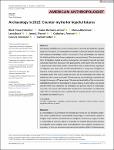Archaeology in 2022: Counter‐myths for hopeful futures
| dc.contributor.author | Berihuete‐Azorín, M | |
| dc.contributor.author | Blackmore, C | |
| dc.contributor.author | Borck, L | |
| dc.contributor.author | Flexner, JL | |
| dc.contributor.author | Frieman, CJ | |
| dc.contributor.author | Herrmann, CA | |
| dc.contributor.author | Kiddey, R | |
| dc.date.accessioned | 2023-12-18T11:16:06Z | |
| dc.date.available | 2023-12-18T11:16:06Z | |
| dc.date.issued | 2023-11-10 | |
| dc.identifier.issn | 0002-7294 | |
| dc.identifier.issn | 1548-1433 | |
| dc.identifier.uri | https://pearl.plymouth.ac.uk/handle/10026.1/21802 | |
| dc.description.abstract |
Archaeology in 2022 features more calls than ever for a socially and politically engaged, progressive discipline. Archaeologists increasingly respect and integrate decolonizing and Indigenous knowledge in theory and practice. They acknowledge and embrace the fluidity and diversity of sexes and genders, past and present. They document patterns of migration, ancient as well as contemporary, to combat retrograde and racist narratives that remain pervasive in the public sphere. At the same time, the field has a deep‐seated conservative bastion toward which many scholars retreat, arguing for an “objective” past that is free of political implications or interpretive ambiguity. As anarchist archaeologists, we see the myth of the objective past as one of many interconnected myths that have provided the basis for an archaeology that reifies and proliferates the current social order. We deconstruct myths relating to capitalist and colonialist ideologies of “human nature,” the assumed inevitability of the current order, and fatalistic commitment to dystopian or utopian futures. As alternatives, we present counter‐myths that emphasize the contingent and political nature of archaeological praxis, the creative and collaborative foundation of communities, the alternative orders that archaeology uncovers, and the role of a hopeful past for constructing the possibilities of different futures. | |
| dc.format.extent | 135-148 | |
| dc.language | en | |
| dc.publisher | Wiley | |
| dc.subject | anarchist archaeologies | |
| dc.subject | capitalism | |
| dc.subject | counter-narrative | |
| dc.subject | colonialism | |
| dc.subject | climate disaster | |
| dc.subject | futures | |
| dc.subject | migration | |
| dc.subject | multispecies | |
| dc.subject | myth | |
| dc.title | Archaeology in 2022: Counter‐myths for hopeful futures | |
| dc.type | journal-article | |
| dc.type | Review | |
| plymouth.issue | 1 | |
| plymouth.volume | 126 | |
| plymouth.publisher-url | http://dx.doi.org/10.1111/aman.13940 | |
| plymouth.publication-status | Published | |
| plymouth.journal | American Anthropologist | |
| dc.identifier.doi | 10.1111/aman.13940 | |
| plymouth.organisational-group | |Plymouth | |
| plymouth.organisational-group | |Plymouth|Faculty of Arts, Humanities and Business | |
| plymouth.organisational-group | |Plymouth|REF 2021 Researchers by UoA | |
| plymouth.organisational-group | |Plymouth|Users by role | |
| plymouth.organisational-group | |Plymouth|Users by role|Academics | |
| plymouth.organisational-group | |Plymouth|REF 2021 Researchers by UoA|UoA28 History | |
| plymouth.organisational-group | |Plymouth|Faculty of Arts, Humanities and Business|School of Society and Culture | |
| plymouth.organisational-group | |Plymouth|REF 2028 Researchers by UoA | |
| plymouth.organisational-group | |Plymouth|REF 2028 Researchers by UoA|UoA28 History | |
| dcterms.dateAccepted | 2023-10-01 | |
| dc.date.updated | 2023-12-18T11:16:01Z | |
| dc.rights.embargodate | 2023-12-19 | |
| dc.identifier.eissn | 1548-1433 | |
| rioxxterms.versionofrecord | 10.1111/aman.13940 |


